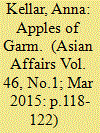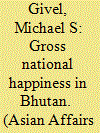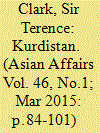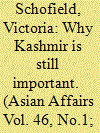|
|
|
Sort Order |
|
|
|
Items / Page
|
|
|
|
|
|
|
| Srl | Item |
| 1 |
ID:
137386


|
|
|
|
|
| Summary/Abstract |
This article surveys the challenges faced by agriculture in present-day Tajikistan. These include the collapse of supply chains, lack of access to markets and a shortage of labour following the collapse of the USSR – problems which Tajikistan has not been able to remedy unlike some other Central Asian states. This article looks at the effect of the problems, and the recent efforts to reform laws of land tenure in Tajikistan. It examines the effect of these reforms, particularly on families and women, and surveys the prospects that the latest reforms have for successful implementation.
|
|
|
|
|
|
|
|
|
|
|
|
|
|
|
|
| 2 |
ID:
137379


|
|
|
|
|
| Summary/Abstract |
This article charts the history of the Buraimi Oasis affair, the boundary dispute between Saudi Arabia and the neighbouring Trucial Coast (later the United Arab Emirates) and Oman. Having laid out the pre-20th century context, the article traces the rise of the dispute from the discovery of oil in 1932 and the protracted negotiations over the eastern borders of Saudi Arabia (and hence the partitioning of any oil concessions) between Saudi Arabia, the UK and US, factoring in the complex interests of the various oil companies in their exploration of the region. The climax of the affair came in the 1950s, with efforts by Saudi Arabia to win over the areas tribes frequently by bribery, whilst moves were made towards arbitration despite military tension. The article examines the continuing role of the UK in the government of the Trucial coast and Oman throughout the period, the impact on US-UK relations, and the longer-term consequences of the boundary dispute. It also considers the role played by the oil companies such as Aramco in the affair.
|
|
|
|
|
|
|
|
|
|
|
|
|
|
|
|
| 3 |
ID:
137383


|
|
|
|
|
| Summary/Abstract |
Though the build-up of China's blue-water fleet is causing consternation in foreign-policy circles, the country's on-going expansion into Russia and the former Soviet Union has scarcely garnered comment. For the past decade, China has used its foreign reserves to acquire strategic assets (principally infrastructure and natural resources) and tracts of sovereign territory along its existing borders and increasingly further afield. The impact on targeted countries (and, in turn, their own foreign policy) is extreme, with serious implications for security and economics far beyond their borders. This article provides an overview of China's acquisitions and investments in Eurasia, followed by more detailed discussion of recent developments and responses in Central Asia, Ukraine and Mongolia, and Siberia. It then looks at the impact of China's actions on Sino-Russian relations, discusses the importance of Russia and Central Asia as a resource corridor and buffer zone between Europe and China, and suggests how these manoeuvrings might result in long-term benefits for China.
|
|
|
|
|
|
|
|
|
|
|
|
|
|
|
|
| 4 |
ID:
137385


|
|
|
|
|
| Summary/Abstract |
This policy essay examines the historical and policy evolution in Bhutan from the creation of Bhutan in the 1600s to 2014. An examination of the overarching policy intent of Gross National Happiness is reviewed as well as how modern political institutions in Bhutan implement Gross National Happiness. In the 17th and 18th centuries, the new Bhutanese state founded by the Shabrung Ngawang Namgyal established its political and institutional right and legitimacy to rule based on Mahayana Buddhism canonical tenets, including ensuring that Bhutanese citizens could obtain Enlightenment and happiness. A modern manifestation of this historical precedent for state and political institutional intervention to promote collective happiness is embodied in the policy of Gross National Happiness. This essay concludes by noting that modern Gross National Happiness is a holistic development approach based on a trend emanating from more ancient Mahayana Buddhist traditions Gross National Happiness balanced with modern economic, governmental, and social conditions with Mahayana Buddhist spiritual requirements embodied in Gross National Happiness.
|
|
|
|
|
|
|
|
|
|
|
|
|
|
|
|
| 5 |
ID:
137384


|
|
|
|
|
| Summary/Abstract |
This article offers a historical overview of the situation of the Kurds and Kurdistan from antiquity to the present day. It then describes the travels of the author, who was the British Ambassador to Iraq from 1985 to 1989, around the Kurdish region, with a wealth of social, cultural, and political observation. Of particular note are the author's observations on the period of Saddam Hussein's chemical attacks on the Kurdish region during the 1980s. There are also descriptions of encounters with the region's religious minorities, and also Kurdistan's architectural heritage. The author concludes with a discussion about the future prospects for the autonomy and independence of the region.
|
|
|
|
|
|
|
|
|
|
|
|
|
|
|
|
| 6 |
ID:
137382


|
|
|
|
|
| Summary/Abstract |
It is often assumed that Herat is a backwater in Afghanistan's national politics. Many consider it to be merely a conduit for Iranian influence, and that it doesn't have the relevance of provinces such as Kandahar or Helmand. This analysis challenges these assumptions. The article looks at Herat's place in Afghan politics over the period from 1978 to 2014, with specific and detailed reference to the anti-Soviet 1979 uprising, examining the influence that actors such as the USSR, Iran, Peshawar and various mujahedeen factions have attempted to bring to bear on the city, and focusing on how despite these pressures the city has in many ways been a self-directed and autonomous player, often setting the lead in terms of Afghan national politics. Herat and Kabul relations have frequently been marked by suspicion, but the author argues that Herat is still an integrated part (even if not well integrated) of the Afghan polity, and its troubled relations with Kabul are of more moment than its relationship with Tehran.
|
|
|
|
|
|
|
|
|
|
|
|
|
|
|
|
| 7 |
ID:
137381


|
|
|
|
|
| Summary/Abstract |
The Umbrella Movement is the culmination of Hong Kong's protracted democratization process. This paper uses a historical perspective to explain the present situation. Students, which had been at the forefront of political activism in the 1970s, have yet again taken a leading role in the current movement. This has occurred as the democracy movement, which was buoyed by modest democratic reforms since the 1980s, has become deeply divided in recent years. Political parties of the pan-democratic camp, which played an important role in the 1990s, have been eclipsed by more assertive protest movements. The very slow progress of democratic reforms in Hong Kong is, however, due to the ruling elite. On the one hand, there is the authoritarian government in China which is worried about greater autonomy in its Special Administrative Region as well as potential spillover effects that could threaten one-party rule. At the same time, the powerful business elite in Hong Kong, Beijing's key ally, is worried that greater representative politics could lead to more substantial social redistribution.
|
|
|
|
|
|
|
|
|
|
|
|
|
|
|
|
| 8 |
ID:
137380


|
|
|
|
|
| Summary/Abstract |
Kashmir, at present, is not being treated as a priority by politicians or policy makers. The author argues that this is a grave mistake. The ground realities which have continued to blight the lives of millions in the region for decades have not been resolved. Not only do they demand resolution, but leave the region fragile and unstable, a danger exacerbated by the nuclear capabilities of India and Pakistan. The domestic narratives within India and Pakistan which lead to heightened hostility have been exacerbated by recent events such as the Mumbai Hotel attacks and cross-border skirmishes. A resolution of Kashmir would reverse these inherent tensions. The unresolved situation also undermines the human rights of the inhabitants of Kashmir. Likewise, it leads to an unconscionable waste of the natural resources of the region, as well as needless restrictions in Indo-Pakistani trade and money being tied up in military conflict. A resolution of the conflict would also have wide-scale benefits in the region, reaching to Afghanistan and China. In conclusion, the author surveys what might be practical ways of resolving the Kashmir problem.
|
|
|
|
|
|
|
|
|
|
|
|
|
|
|
|
|
|
|
|
|